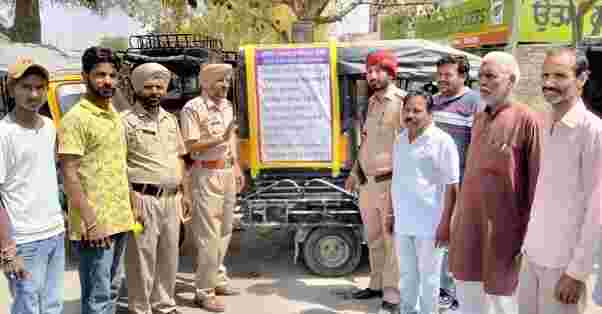DGP Punjab directs Traffic Police to strictly enforce 25km/h speed limit in school zones
— Advanced Traffic Management Technologies and Traffic Police personnel strength to help in averting road accident fatalities: DGP Punjab VK Bhawra
— Scientifically driven enforcement drive targets to long-term behavioral change, reducing accidental deaths by 15% to 20%: ADGP Traffic AS Rai
Chandigarh, April 4:
In a move aimed to avert road accident fatalities and improve road safety conditions in the state, Punjab Police has launched a state-wide Road Safety Education and Enforcement Drive with focus on ‘Moving Traffic Violations’. The moving traffic violations includes drunk driving, non-wearing of helmet or non-fastening of seat-belt, over-speeding, high-beam, use of a mobile phone while driving, and jumping traffic signals.
Divulging details, Director General of Police (DGP) Punjab VK Bhawra said that the entire enforcement strategy is planned based upon the past year trends and reason for the road accidents.
“On an average daily, Punjab loses 11-12 valuable lives in various road accidents, the majority of which can be prevented or reduced in severity by focusing on moving traffic violations,” said the DGP, adding that Advanced Traffic Management Technologies and Traffic Police personnel strength is also being increased to cover traffic management operations until mid-night, when maximum road accidental deaths took place.
Following the fixation of vehicular speed limit in school zones to 25 km per hour by the Punjab Transport Department, the DGP strictly ordered Traffic Police to implement these orders and issue challan if anyone violates the speed limit.
The data shows that the average about 45% road accident deaths involve Two- Wheelers and are largely hit by Four Wheelers and Trucks due to over speeding, drunk-driving, use of mobile phone, non-wearing of helmet or seat belt by either victim or accused.
Additional Director General of Police (ADGP) Amardeep Singh Rai in a meeting with all the District Traffic Police Officials, directed them to stress on minimizing the moving traffic violations by educating commuters, challenging them or using any other suitable measures so that valuable lives can be saved.
“It is a very scientifically driven enforcement drive, targeting long-term behavioral change focusing on “target hardening,” said ADGP Rai, adding that with such enforcement strategies, road accidental deaths could be reduced by 15-20% in the present scenario.
He said that to begin with, the first 15 days of the drive will be focused on road safety education and awareness, to alert and aware commuters, followed by a strict enforcement drive.
Meanwhile, during COVID-19 restrictions, many such experiments helped to strategize evidence based traffic enforcement action plans specifically suitable for the needs of Punjab.








